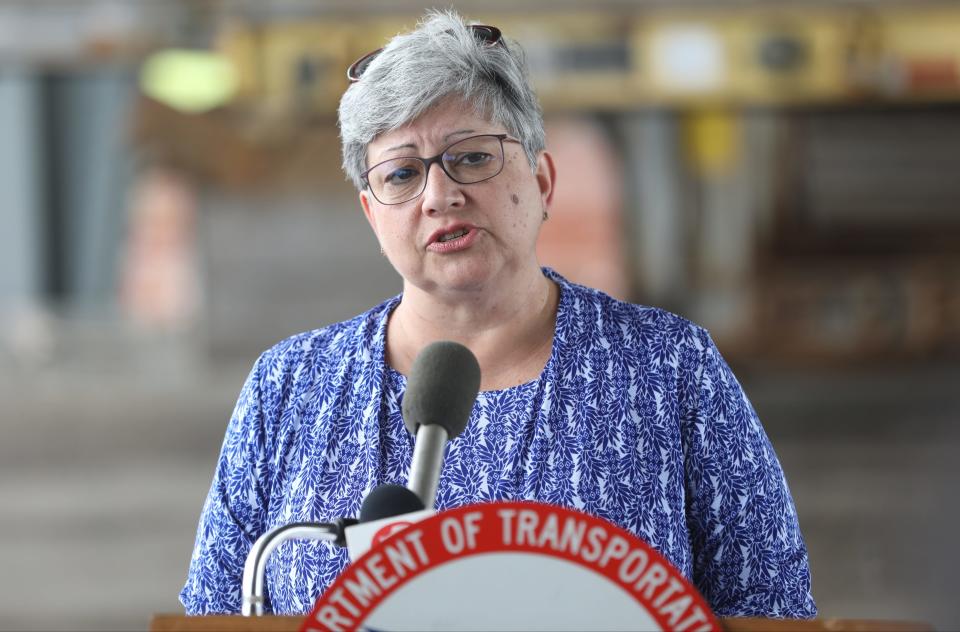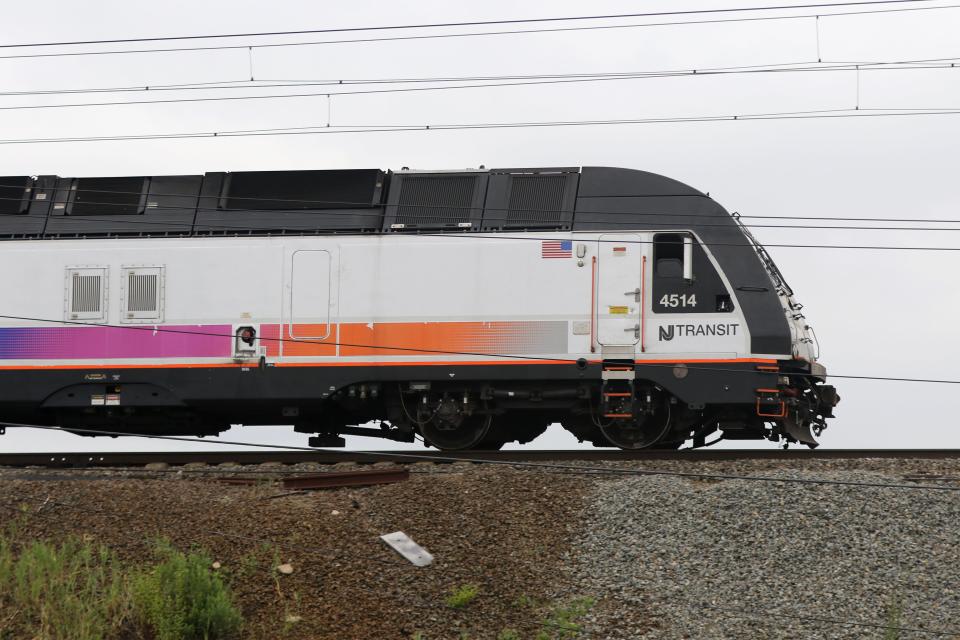NJ Transit fare hikes? Service cuts? Layoffs? Agency faces a nearly $1B deficit in 2026
- Oops!Something went wrong.Please try again later.
NJ Transit’s latest budget documents predict a larger impending fiscal crisis than last year's estimates — a nearly $1 billion annual budget shortfall expected by 2026.
But if the past three years are any indication, it’s likely going to be even worse.
To address this, state Transportation Commissioner Diane Gutierrez-Scaccetti announced Wednesday that a restructuring analysis will get underway "very quickly." The commissioner, who is also NJ Transit’s board chair, informed reporters of the plan Wednesday afternoon before the board meeting.
"It is not something that we solve in one year and it goes away, it’s something that is structural to our operating budget and has to have a long-term solution," Gutierrez-Scaccetti said.
The plan to restructure the agency was not announced at Wednesday’s board meeting, but the board approved transmitting the agency's fiscal year 2024 budget to Trenton for lawmakers to review before budget negotiations this June.
Board members Shanti Narra and Bob Gordon raised concerns about the anticipated fiscal cliff and called on Gov. Phil Murphy and legislators to provide additional assistance to the agency through dedicated funding and to avoid putting the brunt of the budget woes on straphangers.
“Absolutely this organization needs dedicated funding," said Narra. Agency officials' "hands are tied and they’re hamstrung in so many ways because they have not gotten adequate funding for all these years. The vast majority of people who use NJ Transit … use it because they need to. And so I don’t think burdening those people with fare increases is appropriate.”
Before the end of the meeting, the board voted to approve Kiabi Carson to replace Cedrick Fulton as vice chair after he resigned over concerns about the fiscal health of the agency.
Gutierrez-Scaccetti noted that Carson’s experience in human resources would be a timely asset at the agency.
“Kiabi is going to be able to help us very significantly in the work we have to do in the coming months to streamline NJ Transit’s operations to help us attempt to cut costs,” she said.
Will 'restructuring' mean fare hikes, service cuts, layoffs?
Gutierrez-Scaccetti said the restructuring analysis will focus on three main areas: consolidating the corporate structure, looking at fares, and weighing "service realignments." She emphasized that "all options are on table" and no decisions have been made yet.
Asked who is leading this review, Gutierrez-Scaccetti said it would be a mix of people from the Transportation Department and NJ Transit.

"We, as an administration, are going to look at how we deal with transit fares in an equitable way to ensure that we can use fares to help us close this gap," she said, adding that they will look at "how we best align service to our highest-demand customers and make certain that in doing so we don’t leave the customers on the lower-demand lines behind."
Bailey Lawrence, a Murphy spokesman, said the agency will "responsibly and nimbly adapt" to the challenges.
"The Murphy administration will identify and evaluate an array of potential solutions that will improve NJ Transit’s fiscal stability and efficiency. Throughout this realignment process, the quality of service and accessibility of our world-class public transportation system will remain our top priority," Lawrence said in a statement.
Fiscal cliff: NJ Transit lacks a key asset other agencies have. Without it, there could be service cuts
More spending: As fiscal cliff looms, NJ Transit forges ahead with ambitious spending plans
NJ Transit President and CEO Kevin Corbett has maintained for years that it is essential to maintain service in order to entice people to return to public transportation.
After Wednesday’s board meeting, Corbett said, “We have to be prudent, live within our means and look at all things before we go asking people for money.”
As far as the corporate structure, Gutierrez-Scaccetti said, "We really need to streamline how that organization is laid out and transform the corporate structure to drive efficiencies."
News of seeking efficiencies and reorganizing comes as the agency is finalizing a lease for a new corporate headquarters at 2 Gateway in Newark that would increase its office footprint by more than 20% and move the staff to one of the city's more expensive office buildings.
Reaching a crisis point
The Murphy administration, agency officials and its consultant, McKinsey, overestimated during the last three budget cycles how many people would return to riding trains, buses and light rail after the COVID pandemic — and therefore over-budgeted how much revenue from ticket sales the agency would pocket.
Wednesday’s budget documents show the agency’s farebox revenue is expected to fall short by $30 million this fiscal year when compared with what was first budgeted in July, indicating that people aren’t returning to public transportation as quickly or fully as the agency hoped.
Since 2020, the agency has used federal COVID aid to plug those farebox gaps, but it's burning through that cash faster than planned. Last year, the agency was forced to use $75 million more in COVID aid than it originally forecast. To close budget shortfalls, it also diverted an additional $70.2 million in funds from capital to operating to balance its budget for fiscal year 2022.

By 2026, NJ Transit’s federal COVID relief money is expected to run out.
In fact, agency officials are now predicting that there will be a $119 million budget gap in fiscal year 2025 and a $917.8 million shortfall in fiscal year 2026. Last year, there was no prediction of a shortfall in 2025 and the gap in 2026 was estimated at $842.6 million.
Multiple structural deficits
Gutierrez-Scaccetti said the decision to pursue a "much broader organizational strategy than we have in the past" was prompted by the agency's coming structural deficit from lagging farebox revenue.
But NJ Transit already had structural deficit problems plaguing its budget before the pandemic.
Most public transportation agencies are designed to have an operating deficit to keep fares affordable. That budget gap is then filled using state aid, a mix of dedicated taxes, fees or surcharges. NJ Transit, however, is an anomaly because it doesn't have state aid dedicated to the agency by law.
Doug O’Malley, executive director of the nonprofit Environment New Jersey, said this makes NJ Transit “uniquely vulnerable.”
“You cannot make up that hole merely through service cuts and fare hikes,” he said, noting that a $100 million budget hole in 2015 was fixed by cutting three bus routes and raising $56 million in fares hikes. “That almost seems quaint now, and that’s why when you hear from straphangers in this room, it is critical that the solution ultimately will not be solved here, it will be solved in Trenton by legislative leaders and the governor.”
Customer advocate: NJ Transit's customer advocate role remains empty. Could this bill give it new life?
NJ Transit HQ: Questions loom over NJ Transit deal to move to site owned by Murphy campaign donors
New Jersey's governor and Legislature decide on an annual basis how much money to send NJ Transit and where to pull that money from, which often changes.
The Murphy administration gave NJ Transit a boost thanks to the New Jersey Turnpike Authority's shifting some state money over, and the agency got a bump in state operating assistance, but it also proposed reducing the amount of money the agency gets from the Clean Energy Fund. All told, state assistance is budgeted to be around $650 million in fiscal year 2024, down from the $903 million so far projected to be disbursed this fiscal year.
Another budget-filling resource is to take dollars from the capital budget. That habit started at NJ Transit in 1990 at $9 million and has ballooned over the last three decades to hundreds of millions of dollars. Multiple governors and legislatures have allowed the practice to become an annual fixture in NJ Transit's budget.
The effects of Trenton's inability to make NJ Transit's budget and aid a priority are hard to miss.
Projects like Hudson-Bergen Light Rail haven't gotten done after more than 30 years of studies, planning and construction. Bus garages and networks are outdated, over capacity and short of funding to prepare for a zero-emission future. And train cancellations have been a persistent problem in recent years, first because of staffing and now because of aging equipment.
A coalition of nonprofits, community groups and business interests have formed the Fund NJ Transit Coalition to shore up support among lawmakers to dedicate funds by law to NJ Transit.
“Now is the time for Governor Murphy and the New Jersey Legislature to work together to secure dedicated, recurring funding for NJ Transit operations before the close of this year’s budget,” said Zoe Baldwin, New Jersey director for the Regional Plan Association and founder of the coalition. “This fiscal cliff, if not addressed, will mean that transit riders will likely face a significant increase in fares or reduction in services in the near future — perhaps both.”
While some legislators have shown an interest in this issue, none has come out to champion it.
Asked whether there is much discussion taking place among Murphy officials and legislators to address the state aid and capital fund diversion issues, Gutierrez-Scaccetti said it’s not a question she’s entertaining right now.
“I don’t even know what I would be asking for,” she said. “We will look at all options, and when we develop a plan we will consider what we need, what we aren’t able to close on our own, and how we may be able to bring that money to the table.”
This article originally appeared on NorthJersey.com: NJ Transit is facing a nearly $1B hole in 2026. Why it may get worse

